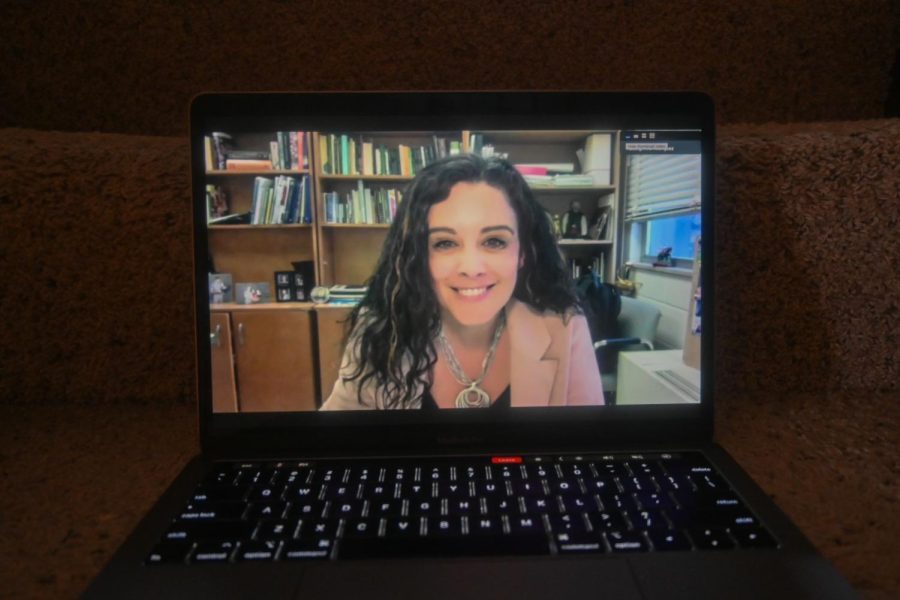UI institutional track update highlights faculty members’ negative experiences
The University of Iowa Faculty Council voiced concerns regarding the instructional track for professors because of poor faculty representation and term length issues on Tuesday.
Ana Rodríguez speaks to faculty senate members during a University of Iowa Faculty meeting over zoom on Tuesday, April 12, 2022.
April 12, 2022
Members of the University of Iowa’s Faculty Council are concerned about the implementation of the instructional track for faculty because of unclear titles, underrepresentation in faculty organizations, and improper term lengths.
University of Iowa’s Instructional Faculty Track Review Committee members delivered a review and progress report covering the first five years of the tracks at the council meeting on Tuesday.
The report, delivered by English Professor Anne Stapleton and Law Professor Caroline Sheerin, covered the problems they perceived within the track five years after it was established in 2017, including interim track faculty representation, unclear titles and ranks, and term lengths.
Members of the instructional track are distinctly different from tenure and tenure-track professors, because they are employed by the colleges and are “primarily engaged in the teaching mission,” according to the UI Operations Manual.
Instructional faculty morale was the focal point of the presentation.
“It can pretty much be summarized by the following: it is low,” Sheerin said. “The faculty on the instructional track are feeling that they are not getting the respect that they feel that they deserve at the university.”
Lucia Gemmani, a faculty member in the French and Italian department, is also a member of the instructional track faculty. She said she is dealing with a lot of uncertainty in her career right now because of the university’s indecision.
“It is frustrating,” Gemmani said. “It is the 12th of April; my contract ends on the 30th of June. I still don’t know if I will be renewed for next year, and I’ve already been asked to create syllabi for the fall and buy books, and I don’t even know if I will be here in the fall.”
Gemmani said she’s appreciated the work done by the review board, which suggested more job security and longevity for members of the instructional faculty.
“They’re using this policy to avoid creating stable positions,” Gemmani said. “That’s a lot of work and a lot of budget that they don’t want to invest in faculty.”
The report also recommended changes to term limits, which would allow assistant professors to serve three-year terms, associate professors to serve five-year terms, and professors to serve five-to-seven-year terms under the intermediate track.
The review committee surveyed instructional track faculty throughout the process, with 31.13 percent of faculty members on the track believing the current term length is inappropriate. Respondents also expression “frustration” from seeking job responsibilities, teaching, service, and professional productivity.
Other recommendations included improving intermediate faculty’s representation in organizations including the Faculty Senate. Stapleton said instructional track faculty representation within the faculty senate is not reflective of their population’s percentages in the colleges.
“There are no instructional track faculty represented from engineering, which has 15.3 percent of the regular faculty [population],” Stapleton said. “There are no instructional track faculty from nursing, which has 37.5 percent of its faculty in the instructional track.”
Sheerin provided the presentation with the four takeaways for the faculty in general, including:
- Ensure committed faculty
- Build a stronger institution
- Raise the quality of teaching at the UI
- Lead other institutions
Faculty Council President Teresa Marshall said despite the concerns voiced by the council members, the UI and faculty have done well to lead the way on the development of the instructional faculty track.
“We are ahead of other institutions,” Marshall said. “We have done really great work.”



